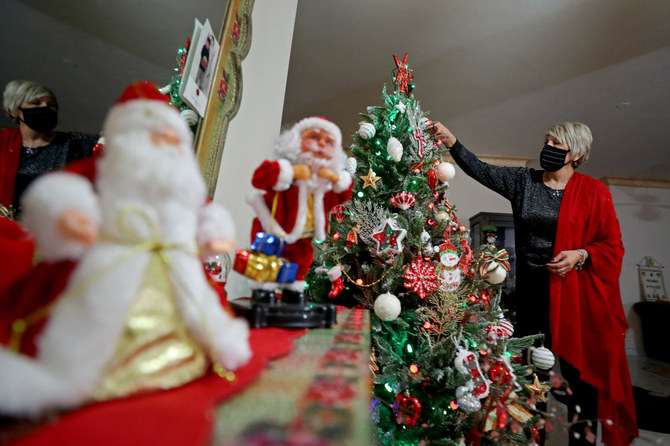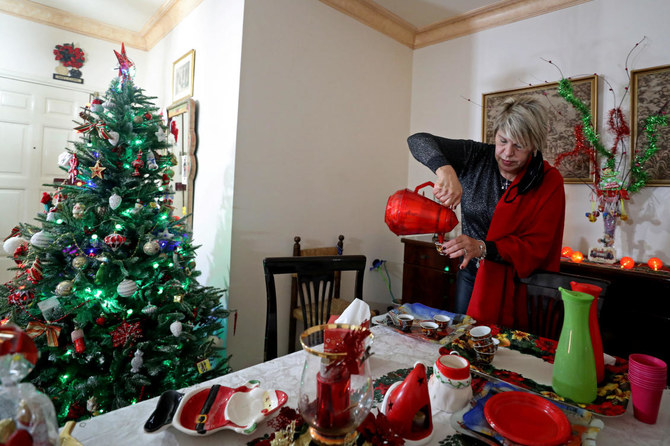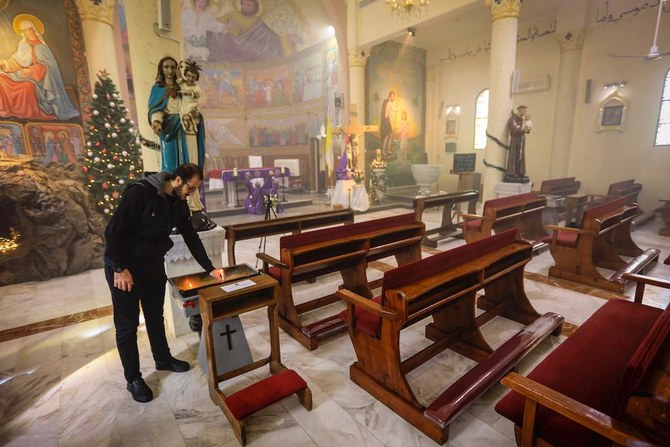GAZA CITY: Nasr Al-Jaldah and his fellow Christians living in Gaza face a canceled Christmas mass as the coronavirus pandemic hits the small enclave’s churches.
The celebration usually offers a brief respite for Christian Palestinians living under an Israeli blockade that stops them traveling outside the territory to see family or from taking part in celebrations in Bethlehem in the occupied West bank.
Coronavirus cases have rapidly increased in recent weeks in Gaza, with its Hamas rulers imposing tough restrictions. As Israel trumpets the start of an inoculation campaign, Palestinian leaders in both Gaza and the West Bank have been left scrambling to secure vaccines.
The church in Gaza will broadcast the mass directly online for people confined to their homes after the authorities stopped all gatherings, but it is little consolation for the small Christian community
“After years of conquering the Israeli blockade, coronavirus comes to increase our worries and kill our joy of the holiday,” Al-Jaldah told Arab News. “The atmosphere does not help with joy and celebration,” he added.
He said that while he had decorated and put lights on his Christmas tree in his home in the Zeitoun neighborhood of Gaza City, he did not feel the usual joys of the holiday season.
The last count by the YMCA in 2014 found fewer than 1,100 Christians living in the Gaza Strip, among a population of 2 million. Their numbers have steadily declined from the 6,000 recorded in the 1960s, before Israel occupied the territory.
Since Israel imposed a siege on Gaza after it was taken over by Hamas in 2007, Christians there have suffered a series of military and humanitarian crises along with the Muslim majority.
“A Christian is a Palestinian citizen, and he receives what is attained by everyone, and we are all in one boat,” Al-Jaldah said. “We share the joys and sorrows. The siege, wars and even coronavirus do not differentiate between a Muslim and a Christian.”
Israel’s siege includes severe restrictions on the movement of Palestinians out of the Gaza Strip.
For nine years, Israel has prevented Al-Jaldah, 61, from obtaining a permit to travel.
He has been banned from celebrating Christmas in Bethlehem, but he was dealt an even more bitter blow five years ago when he was declined permission to see his daughter and grandson at their home in Ramallah in the West Bank. He has still not seen his grandson since he was born.
“Every year Israel deliberately kills our joy on Christmas, and coronavirus came to eliminate any appearances and rituals for the feast,” he said.
“What is the value of the feast other than the mass and celebrations inside the church and the lighting of the tree, without the exchange of congratulations and visits with family and friends,” Al-Jaldah, said, his voice tinged with sadness.
During the past year, Israel granted his wife and two of his children permits to pass through the Erez checkpoint, but prevented him and his third son from doing the same. “How can a separated family rejoice?” He said.
“My daughter lives in Ramallah alongside my sister, and my brother lives in Jaffa, and we are in Gaza, and we cannot see each other for many years, as if we live in planets isolated from each other.”
George Anton, an activist in the Church of the Latin Monastery in Gaza, said the festive celebrations for this year would be limited to the clergy residing in the church.
The church has urged everyone to celebrate at home to avoid a coronavirus outbreak, Anton said.
“We regret that the situation has reached this state due to the outbreak of the pandemic, which kidnapped the souls of the innocent and deprived us of celebrating the Lord Christ and practicing our religious rituals in the places where the feet of Christ came.
“Christians are an integral part of the Palestinian people. They suffer their suffering and rejoice in their joy, and the Christian has no suffering of its own.
“I am a Palestinian citizen residing in Gaza and carry its identity and concerns. I live under war and suffer from the siege as everyone else does, and Israel practices all forms of oppression against us as Palestinians without discrimination in religion, gender or color.
“Israel violates the rights of Gaza Christians to practice their religious rights and access the Church of the Nativity in Bethlehem, as well as violating the right of Muslim brothers to reach the Al-Aqsa Mosque in Jerusalem, in a flagrant violation of international covenants that guarantees for all the freedom of belief, embrace of religion and practice of rituals,” said Anton.





























